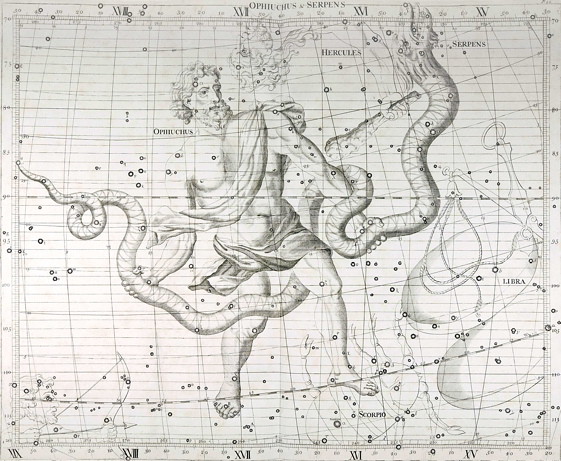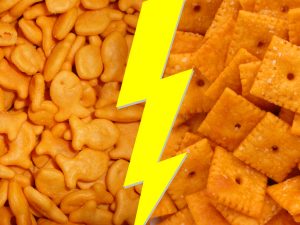Ophiuchus: Debunking the Thirteenth Star Sign

The constellation “Ophiuchus” truly refers to the man outlined by the stars, but is typically pictured with its’ neighboring constellation, “Serpens,” or the Snake.
October 15, 2019
Social media has been abuzz since the middle of September with the announcement of a new Zodiac sign. Ophiuchus, meaning serpent-holder and identified with the Greek god Asclepius, has been peaking both professional and amateur astrologists’ interest alike.
The origin story of the Ophiuchus name dates back to the ancient Greeks and Romans. According to Apollodorus and Hyginus, Asclepius was the son of the Greek god of healing and music, Apollo, and a mortal woman named Coronis. During her pregnancy, Coronis was cheating on Apollo and he, after finding this out, killed her with an arrow. Taking pity on the child, Apollo took him from the flames of a funeral pyre and took his infant son, Asclepius, to be raised by the wise centaur, Chiron. Throughout his life, Asclepius is known as a god of healing and is pictured walking around with a staff that has a single snake wrapped around it. When Asclepius is eventually killed at his grandfather, Zeus’, hand, Zeus raises him and the snake to the sky as the constellation Ophiuchus.
The Babylonians, however, are the ones who created the system that we have known our Zodiac signs for over the past thousands of years. They originally had thirteen signs to line up with the Earth as it was orbiting the sun, but decided to remove one sign so that each month would theoretically have its own sign. The Babylonians, however, never got this wish due to the Earth’s axis shifting and no longer pointing in the same direction after thousands of years.
The entry of the Ophiuchus sign into the Zodiac circle has caused a lot of debate within the astrology community over whether or not the sign exists and if we should put it into use. Many, after gaining knowledge of Ophiuchus, turned to anyone for answers to these questions. They looked at astrology site after astrology sites, some even turning to NASA for help deciphering whether or not they are still an Aquarius or Leo or if something has changed. NASA’s official statement was truly about what the difference was between astronomy, which is a science and is quantifiable, and astrology, which is a belief and can not be proven.
When you are young and you first begin to learn about your Zodiac sign, you might think that your Zodiac sign correlates with how you should be and when you are that way, everything in the universe will be in order. The majority of people on the Internet have been in an uproar about how their personalities and interests might change with the introduction of Ophiuchus, but now it is time to answer the question: Is Ophiuchus going to change anything about your current sign?
The answer is: It depends. It depends on what site you are on that day, it depends if you were born in a certain year, it depends on you. It depends on what you believe to be true about the Zodiac circle in the sky. Ophiuchus has been in the Zodiac circle for years and yet, we said it was just another constellation, but now we have begun to think otherwise. Like NASA’s statement said, astrology isn’t a science, they isn’t a set way to believe in the Zodiac nor can there be since there is no way to prove the Zodiac signs truly do anything to someone’s personality.
Overall, the inclusion of the new Zodiac sign Ophiuchus is all up for your interpretation. If you decide that Ophiuchus fits into your calendar, then it does and Ophiuchus affects your sign. The Zodiac constellation circle and its correlating signs have been up for debate for years on end and have always left the masses with more questions to be answered. The Zodiac signs have always been a gray area and probably always will be, so stay a Sagittarius or become an Ophiuchus because, in the end, it all comes down to you.







